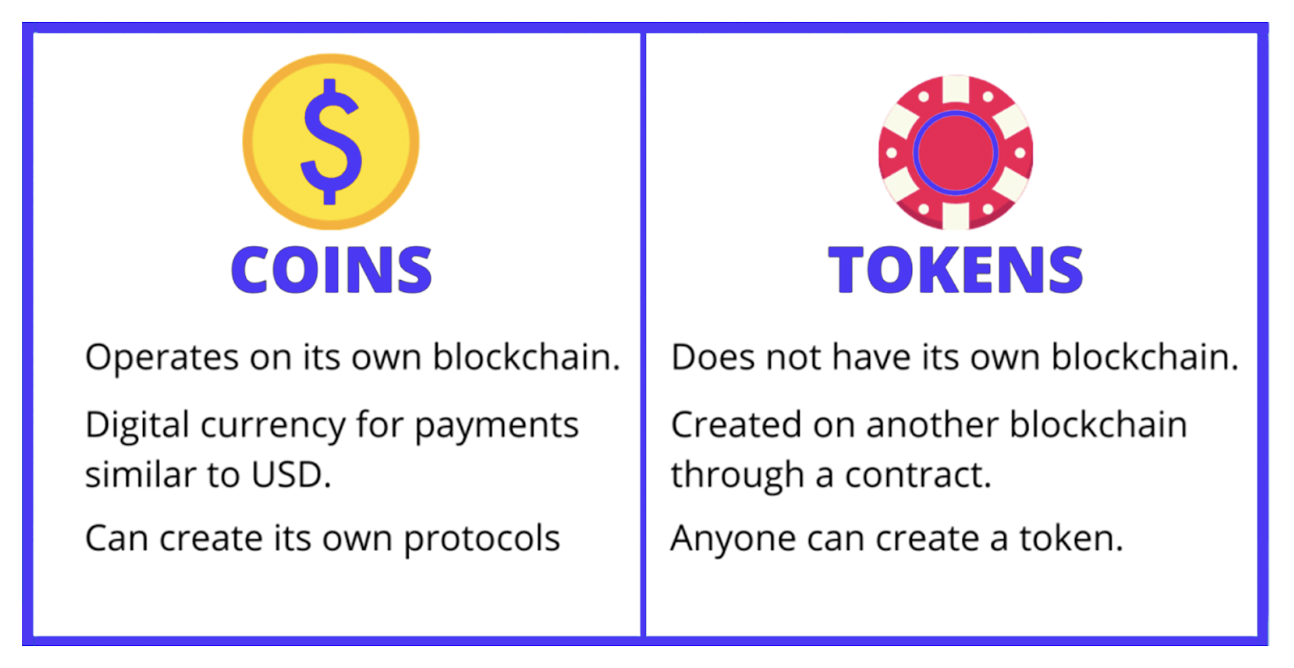Coins & Tokens
Cryptocurrencies generally fall into one of two categories:

- Coins: Can include Bitcoin and altcoins (all cryptocurrencies other than Bitcoin)
- Tokens: Programmable assets that live within the blockchain of a given platform
The term altcoin refers to all cryptocurrencies other than Bitcoin. Some main types of altcoins include mining-based cryptocurrencies, stablecoins, security tokens, and utility tokens.
What is a Coin?
When Bitcoin first came out, it set the standard for what it means to be a coin. There are clear-cut qualities that distinguish crypto coins from tokens, which are similar to real-world money.
Coin characteristics
1. Operates on its blockchain
A blockchain keeps track of all transactions that involve its native crypto coin.
When you pay someone with Ethereum, the receipt goes to the Ethereum blockchain. If the same person pays you back later with Bitcoin, the receipt goes to the Bitcoin blockchain. Each transaction is protected by encryption and is accessible by any member of the network.
2. Acts as a currency (like money)
Bitcoin was created for the sole purpose of replacing traditional money. The paradoxical appeal of transparency and anonymity inspired the creation of other coins, including ETH, NEO, and Litecoin.
You can purchase merchandise and services from many major corporations today, such as Amazon, Microsoft, and Tesla, using crypto coins. Bitcoin has recently become an official currency of El Salvador alongside the US dollar.
3. Can be mined
You can earn crypto coins in two ways:
- Proof of Work (PoW): Traditional mining. Bitcoin hunters employ this method to boost their earnings. The problem with this is that there aren't that many Bitcoins left to mine, so the process becomes more arduous every day.
- Proof of Stake (PoS): This is a more modern approach to earning coins. It's lighter on energy consumption and easier to do. Cardano is one of the biggest coins that adopt this system.
What is a Token?
Unlike coins, tokens do not have their blockchain. Instead, they operate on other crypto coins' blockchains, such as Ethereum. Some of the most commonly seen tokens on Ethereum include BAT, BNT, Tether, and various stablecoins like the USDC.
If crypto coin transactions are handled by blockchain, then tokens rely on smart contracts. They're an array of codes that facilitate trades or payments between users. Each blockchain uses its smart contract. For example, Ethereum uses ERC-20, and NEO uses Nep-5.
This is different from coins because crypto coins do not move around; only account balances change. When you transfer money from your bank to someone else's, your money doesn't go anywhere. The bank changed the balances of both accounts and kept the fees. The same thing happens with blockchain - the balance in your wallet changes, and the transaction notes that.
Another notable difference between tokens and coins is what they represent. While crypto coins are essentially digital versions of money, tokens can stand for assets or deeds.
You can buy tokens with coins, but some tokens can carry more value than any of them. For example, a company's share. However, since there are usually restrictions to where you can spend a token, it doesn't have the liquidity a coin offers.
Simply put, a token represents what you own, while a coin denotes what you're capable of owning.
Updated 3 months ago